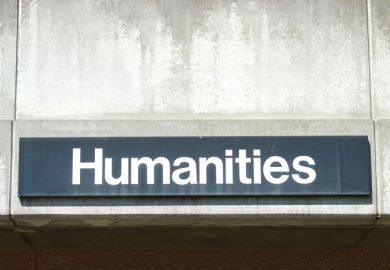Ensuring all university students, including those in the sciences, have access to a “great humanities education” “is the key contribution universities can make to critical thinking”, according to the new dean of arts and humanities at the University of California, Berkeley.
Sara Guyer was speaking at the Times Higher Education Teaching Excellence Summit, held online in partnership with Nankai University, in a session on “The value of critical thinking in a post-pandemic world”, alongside Manu Kapur, director of the Future Learning Initiative and professor of learning sciences and higher education at ETH Zurich.
Critical thinking is one of the “core values” at Berkeley, “especially in the College of Letters and Sciences”, said Professor Guyer, president of the international Consortium of Humanities Centers and Institutes. “Every student is expected to take a course in rhetoric and composition. One of the key aspects of that course is critical thinking” and teaching students – across different disciplines – “how to question what they are reading”, she added.
At ETH Zurich, Professor Kapur said on his courses and in his advice to the institution more widely, the approach is “to integrate critical thinking into the current domain practices”. Across disciplines, no body of knowledge has been built without critical thinking, he added.
“I cannot think of any knowledge work in any domain that does not use critical thinking,” while employers are also increasingly moving to assess critical thinking in job interviews via “situational assessments, group assessments and project-based assessments”, he continued.
As “anti-science” views accelerate during the pandemic, critical thinking becomes more important, and can help people understand the difference between googling and research, argued Professor Kapur.
In an era of political polarisation, critical thinking is key to helping people “navigate complexity” and deal with contradictory concepts, said Professor Guyer.
“The more that universities turn away from valuing the humanities and seeing a humanities education as integral to what universities are about, the more we risk losing those capacities,” she continued.
“When we bring students together in conversation about a concept, about a text, about a work of art, about a piece of music; and we teach students and give students the opportunity to think historically, to think critically…and make arguments about those positions, we are presenting them with a set of skills that will transfer far beyond their experience of a single text.
“I think the thing universities can most enthusiastically do is continue to ensure their students – whatever their area of interest – have access to a great humanities education. They might be engineers, they might be studying biology, they might be studying business; but to ensure that the humanities remain part of all of those courses seems to me to be the key contribution universities can make to critical thinking right now.”
Register to continue
Why register?
- Registration is free and only takes a moment
- Once registered, you can read 3 articles a month
- Sign up for our newsletter
Subscribe
Or subscribe for unlimited access to:
- Unlimited access to news, views, insights & reviews
- Digital editions
- Digital access to THE’s university and college rankings analysis
Already registered or a current subscriber?




